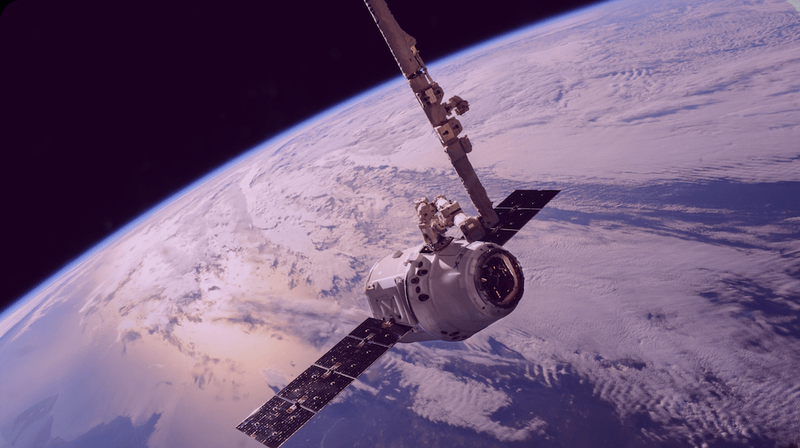Cybersecurity Outer Space: Why you should care
We might not see them, but they're everywhere. Here's why you should care about devastating cyber attacks in space.

Space-based services were traditionally separated from networks on Earth, but as technology evolves, two are becoming more and more interdependent, enabling connectivity and accessibility. With more interdependency, the risks and vulnerabilities of a cyberattack on satellites are also bigger. However, it also targets the need to increase cybersecurity around space-based initiatives, with regulatory frameworks and global collaboration of stakeholders.
A cyberattack could cause two satellites to collide, or one to collide into the International Space Station, or cause anything to orbit permanently and with no control, with irreparable and unpredictable damage both in space and on Earth. We're talking about disrupted communications, essential services failing, lack of aircraft and naval control, and more.
Discussions on whether or how the space is literally a growing battleground for cyberattacks have emerged since February this year, when alleged Russian hackers attacked U.S. satellite company Viasat. By the time of the incident, communications in Ukraine were disabled just before the invasion.
As many countries and governments are issuing warnings regarding advancing cybersecurity legislation, it seems like this discussion could and should reach space. As a matter of fact, since 2020, the U.S. Air Force and the Defence Department’s Digital Service promoted an annual satellite hacking competition, where teams of hackers from all over the world do their best to break into U.S. satellite systems and find vulnerabilities before cyber villains do.
In response to Pentagon concerns, the U.S. Space Operations Command has recently assigned cybersecurity and intelligence specialists to work side-by-side with satellite operators. The idea is to get accurate information about possible threats to detect and protect U.S. systems.
Worrisome data
Back in 2014, Chinese hackers breached the National Oceanic and Atmospheric Administration, forcing IT teams to seal off key data to disaster planning, aviation, shipping and more.
Satellite launches have been increasing rapidly. According to the United Nations' Office for Outer Space Affairs, there are 9,254 objects in orbit.
According to the Space Foundation Database, the global space economy neared US$ 447B in 2020, and that's expected to abruptly increase in the upcoming years. The latest edition of NSR Global Space Economy states that space exploration is projected to create US$ 1.2T (!) in retail revenues in 2020-2030, mainly due to the impact of private initiatives into what used to be a government-dominated environment.
With the space race and initiatives like Blue Origin and SpaceX, private-sector figures like Jeff Bezos and Elon Musk are rapidly pursuing space endeavours. It certainly gives us a glimpse on what the future will bring, and how outer space travel and industry might be more reachable than we thought.
The rise of quantum also brings significant cybersecurity concerns, as it might be a consistent threat to space-based systems. As commercial space initiatives and militarisation grow, the monetary value of sensitive data that hackers might try to steal also grows.
Cyberattacks on Satellites: How do they work?
Space-based systems are complex, but most vulnerabilities might come from ground-based back-/front-end systems that are not that different from environments that hackers are expert at breaking into. That is, they can attack ground systems, space systems, or the link between them at relatively low cost. Jamming (interfering with the reception of broadcast communications), eavesdropping (when a hacker intercepts, deletes, or modifies critical data between two devices), and spoofing (pretending to be another person or source of information) are some of the techniques.
Needless to say, it's necessary to protect all entry and touchpoints with top-notch and high-functioning cybersecurity against devastating cyber invasion from the system-level.
Challenges and what the future holds
One of the biggest challenges is the fact that there are no global standards for satellite security. In 2021, the Cybersecurity and Infrastructure Security Agency (CISA) formed the Space Systems Critical Infrastructure Working Group, precisely to gather government and industry members to build a safe space infrastructure.
The discussion around the vulnerabilities of space assets to cyberattack can no longer be overlooked. Space is an emerging commercial sector, and critical to effective cybersecurity regulations. Given the current geopolitical situation, it might take time, but the wheels have been set in motion to ensure safe and successful operations.
At Vaultree we create the foundation of tomorrow’s communication and data flows. Forget a reality where data is visible, imagine a future where data does not exist in its raw (plaintext) form, everything is always encrypted, but fully usable, and therefore hacks and leaks won’t have such a negative impact anymore. Book a demo and see how it works.
More from our blog
Unmasking Social Engineering Attacks: Types and Prevention Techniques
What you need to know to strengthen your human firewall and keep your data safe
How encryption can help the finance industry win the battle against cyberattacks
Why fully functional data-in-use encryption is THE tool to help financial institutions mitigate the costs of data breaches.
Why Cybersecurity must be a top priority in Healthcare
The healthcare industry is a target for cybercriminals. Here's how cybersecurity can help protect data - and lives.


